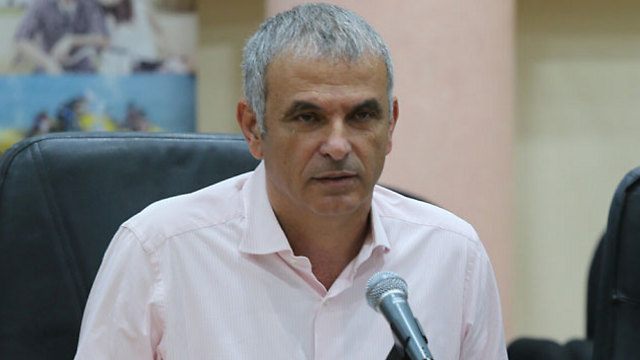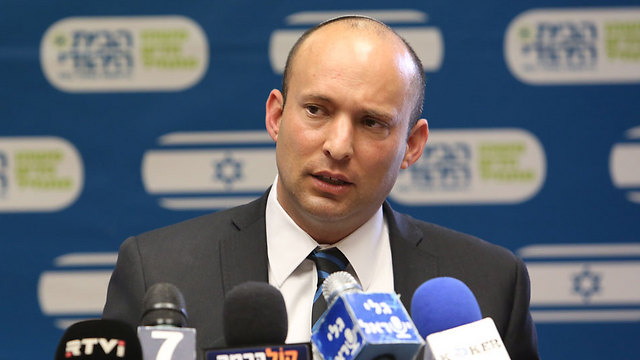
Netanyahu rejects claim that coalition talks hit dead end
Finance Minister Kahlon at odds with Yisrael Beytenu's Lieberman over pension reform while Bennett demands plan to rectify cabinet mishandling as condition to backing changes in gov't.
Prime Minister Benjamin Netanyahu rejected on Monday afternoon claims made by MK Avigdor Lieberman that talks to bring his Yisrael Beytenu party into the government have reached an impasse.
"Every negotiation has its ups and downs. Do you know how many negotiations I've conducted? There are always crises and 'everything is collapsing' all the time. Nothing is collapsing," Netanyahu said at a Likud faction meeting. "I suggest not to get caught up with extreme moods and endless complaining."
"We need to join forces to have a government that is as broad as possible so it could handle the challenges and promote the opportunities the State of Israel is facing," Netanyahu added.
The prime minister went on to say that Israel was "working and seeking to promote a peace process that incorporates security. These are not mere words, this is our policy. I intend to lead this policy and to achieve this goal and others, we need a government as broad as possible."
Netanyahu convened an urgent meeting earlier in the day in an effort to resolve the crisis in talks after Finance Minister Moshe Kahlon rejected Lieberman's demand to increase pension benefits for new immigrants only.
"We compromised on issues of religion and state and on death sentence to terrorists, but we will not compromise on two basic issues: the defense portfolio, and the pension reform," Lieberman said at the Yisrael Beytenu faction meeting on Monday afternoon.
Kahlon told his close associates that the move to bring elderly citizens receiving income support over the poverty line will go ahead regardless of these negotiations, but that he was not willing to accept extortion attempts and sectoral demands.

"Kahlon will not hesitate to be the final gatekeeper for equality in Israel," one of his close associates said.
Kahlon, whose party also announced it would oppose Yisrael Beytenu's flagship death sentence to terrorist bill, is seeking a unified and equal increase of benefits to all elderly people who receive income support, not just to immigrants.
"It's not just for Russian immigrants, as is being presented, but for everyone, and this reform seeks to help the weakest sectors of society. Unfortunately, most of these people are immigrants from the former Soviet Union," he added. "We want to right wrongs, and we're not here to have a bone thrown at us. We cannot accept what we were offered by the Finance Ministry."
Speaking of the negotiations, Lieberman said he "regrets that things are being conducted in this manner. The prime minister and the finance minister know our demands, the cost, and our criteria. This attempt to turn the tables on us creates a bad feeling. The negotiations have reached a dead end and we're waiting on other offers."
Lieberman was also asked of the harsh criticism he has repeatedly leveled at Prime Minister Netanyahu over the past year. "I admit and confess, in the heat of the political argument, unnecessary statements were made. I shouldn't have said it and I apologize for what I said - even if we don't reach understandings and remain in the opposition."
Bennett sets another obstacle
Education Minister Naftali Bennett demanded on Monday that the prime minister implements a plan that will address the cabinet's mishandling of Operation Protective Edge and the Second Lebanon War. Until this plan is implemented, the Bayit Yehudi leader said he will not support changes made to the government, namely bringing Yisrael Beytenu into the coalition.
"In light of the conclusions reached, including that cabinet members were not briefed on quality intelligence and were not properly trained for their jobs and therefore failed to properly manage the IDF in real time, Bennett demands that the prime minister implements a plan to correct these shortcomings," the education minister's office said in a statement.
The plan includes the appointment of a military secretary for the members of cabinet to help prepare them to perform their duties and to brief them on a regular basis on security matters, increasing ministers' visits to the field, and increasing ministers' accessibility to information.
Bennett said he views his demand "as a basic necessity to prevent disinformation and have appropriate supervision required to maintain the safety of the citizens of Israel," adding that "Israel paid a terrible price for these shortcomings during the Second Lebanon War and during Protective Edge."
Tourism Minister Yariv Levin, who heads the coalition talks on behalf of the ruling Likud party, clarified that "we're not having new talks on changing the coalition agreements with any of the partners, including Bayit Yehudi. The party's demand undermines the efforts to complete the expanding of the national government, and I expect the heads of Bayit Yehudi to act responsibly, as required of them."













